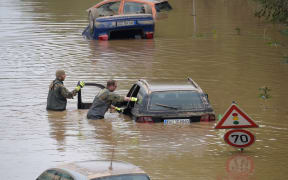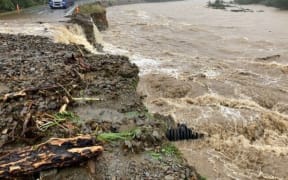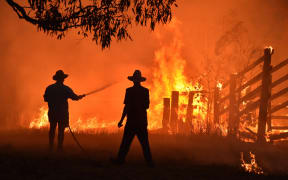Analysis - The difficult discussion about what we are willing to abandon and what is worth saving has begun with the release of the government's new draft plan for dealing with the impacts of climate change.
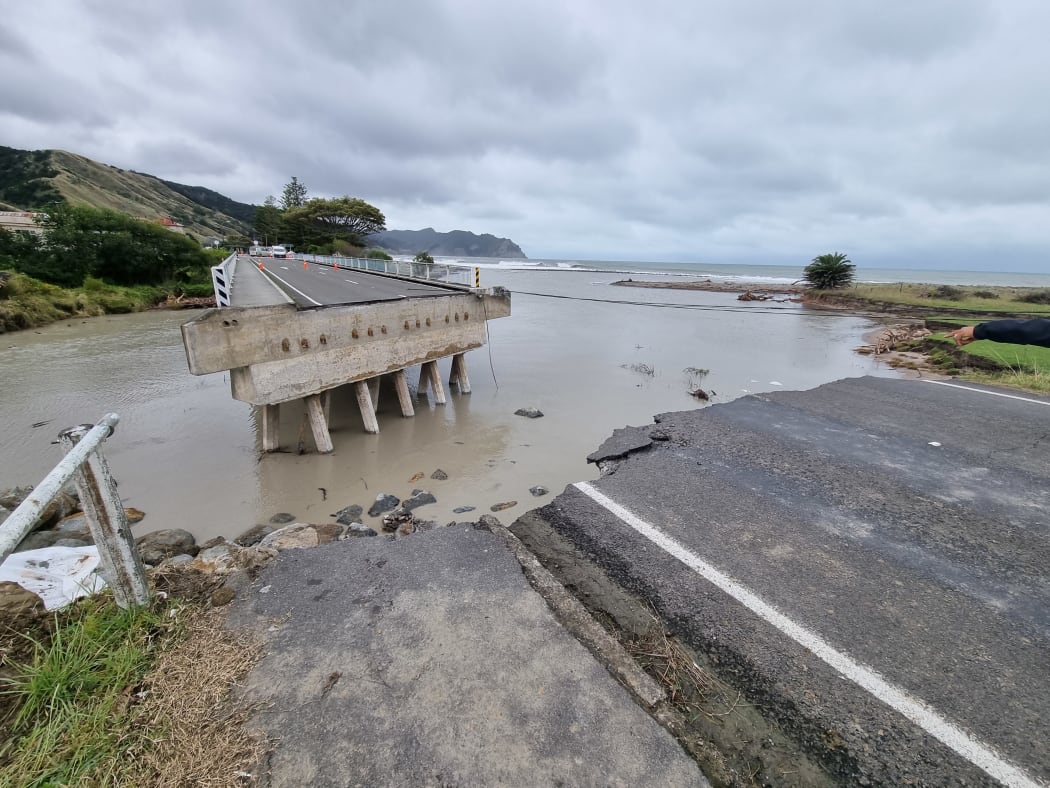
A bridge on the main highway ripped in half, tearing the town of Tokomaru Bay in two during flooding in March. Photo: RNZ / Tom Kitchin
The government wants the public's input on how to prepare for flooding, sea-level rise, wildfire, droughts - and who will pay for it.
Read RNZ's summary of the draft plan here, the government's full plan here, and the consultation documents and info on managed retreat here.
Given the enormity of the challenges of climate change it is astonishing that there has not been a national plan until now.
Its release comes just ahead of the government's comprehensive plan to reduce emissions due next month - we're finally going to have a (hopefully) tangible sense of what the plans will mean for all New Zealanders.
As Minister of Climate Change James Shaw pointed out the savage storms and flooding in the past few years show climate change is already here.
Much of that warming is already locked in - we need a plan on how to adapt to the new reality.
What is 'managed retreat'?
For many this could be the first time they encounter 'managed retreat' - but it is already in practice overseas.
It is basically a plan for abandoning areas and relocating strategic assets away from places it is not possible to or financial viable to protect from sea level rise or flooding.
It is so complicated and potentially costly it needs legislation to be passed.
Local Government New Zealand president Stuart Crosby said getting iwi and public input and buy-in would be crucial.
"To see where the boundaries are in terms of adaptation or retreat - which is a very challenging issue. These conversations ... need to take place."
Crosby said the discussion about who would pay for beachfront properties if they needed to be abandoned would be particularly difficult.
Shaw said managed retreat was a last resort but there needed to be a process - with considerable input from local communities - for working out where it made sense to do so.
Determining who will get paid out, and how much, will be a tricky conversation.
There are some very expensive beachfront properties built fairly recently when the certainty of sea-level rise, coastal inundation, and flooding, was widely known.
However, many of the worst affected areas are likely to be the poorer parts of the country - the East Cape, the West Coast of the South Island or in south Dunedin.
Shaw said the government's duty "first and foremost" was to look after those who could least afford to adapt to climate change.

Minister of Climate Change James Shaw. Photo: RNZ / Samuel Rillstone
Crosby said councils have done numerous studies and tried to inform coastal communities about the risk but have faced considerable pushback when they have tried to get it on paper.
Property owners fear the impact on prices.
"We need [this] national programme that is based on science that can go to councils and communities so they understand what the potential risks are," Crosby said.
He said there was no way that local governments could on their own afford to pay for relocating critical infrastructure relocated out of harm's way.
Who is going to pay for the effects of climate change?
The government is adamant councils and property owners must shoulder some of the cost of adapting to the warming globe as well as insurers and banks.
But Shaw said it did not have a preferred position on where the balance of costs should lie - that was what the consultation period was for.
And yesterday he put councils on notice, pointing out that in 2017 the government made publicly available, and gave to councils, information about how and where coastal erosion and flooding should be taken into account when giving the go-ahead to developments.
He said since then building had happened in a number of risky places and councils could end up in court for damage to properties.
Meanwhile, Shaw said decisions were still being made about where funding for the adaptation plan would come from.
But he said the stakes were high - at a rough estimate about $145 billion of private and public assets and infrastructure were at risk.
How does insurance fit in?
The country risks spiralling insurance costs unless action is taken to reduce the risk of damage from climate change.
Insurance Council chief executive Tim Grafton said the draft plan was a good first step to becoming a more resilient country, and hopefully avoiding large cost hikes.
"And that's how we should be looking at this problem rather than thinking that it is is some kind of insurance problem.
"It is a risk management problem that goes well beyond the role of insurance."
Grafton said in high risk areas like Westport people could still get insurance, and that was not likely to change for a few years.
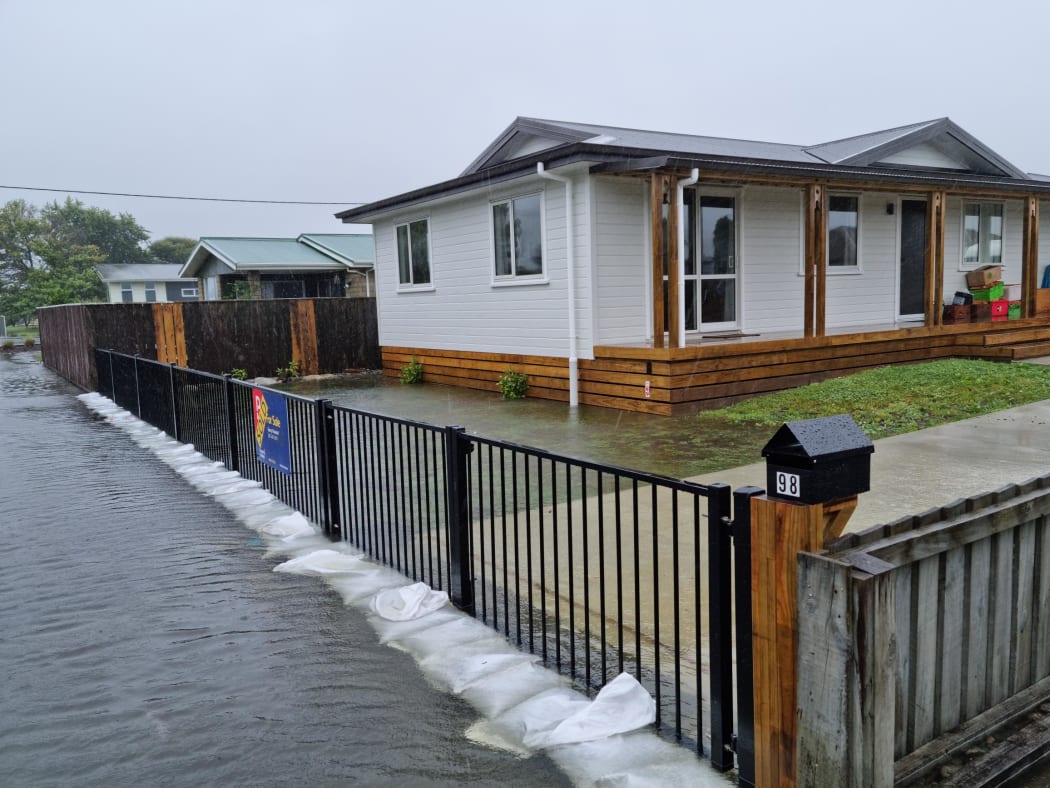
Flooding in Westport in February. Photo: RNZ / Niva Chittock
Insurers did not have a defined trigger point for where insurance would be withdrawn, he said.
Gisborne Mayor Rehette Stoltz said Tairāwhiti has had six climate-related weather events in the past year.
She expected this pattern to continue and feared it will lead to insurance companies pulling out of agreements with home owners or even councils.
Stoltz said her region recognised that over the next decade climate change was going to be one of its biggest issues.
She was happy the government was ready to start the discussion about what to do about it.
But Grafton said he was disappointed that underlying legislation would not come before Parliament until the end of next year.
Adaptation had always been the poor cousin compared to work to reduce climate gas emissions, and it needed to be given more prominence and urgency, he said.
Consultation on the draft adaptation plan closes on 3 June with the the government's final plan due out in August.
Meanwhile, EQC Minister David Clark is leading separate work looking at the flood risk and insurance.


